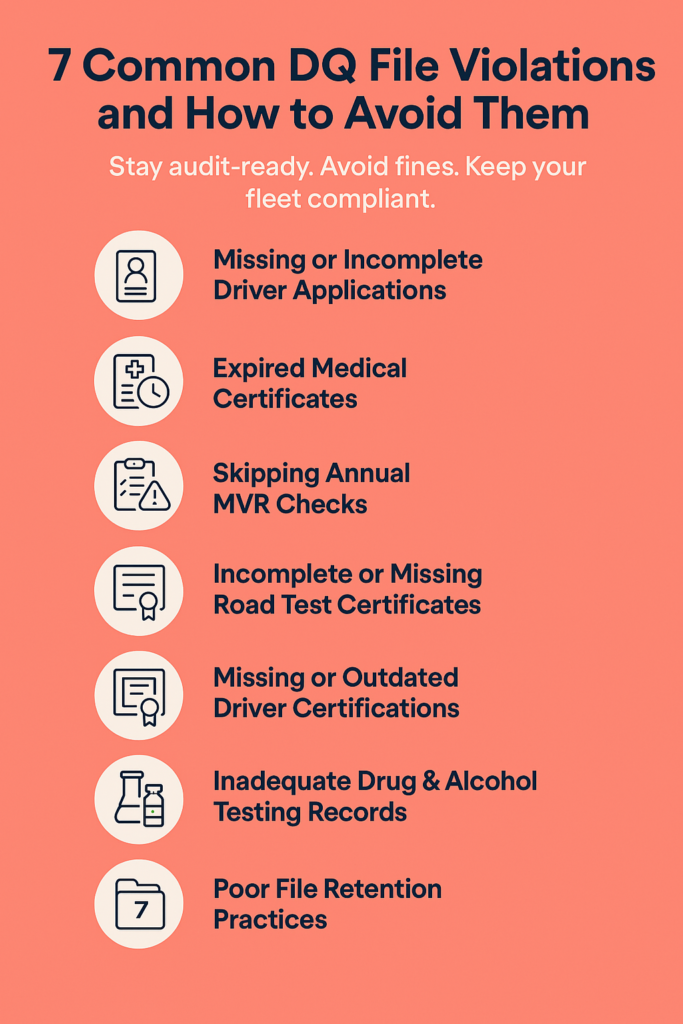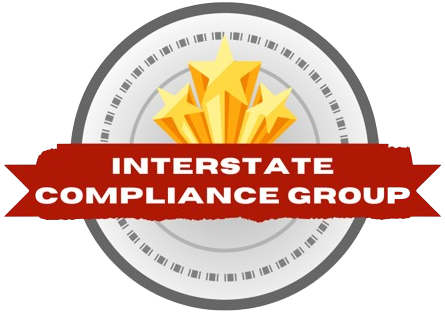Maintaining accurate and up-to-date Driver Qualification (DQ) files is a critical part of FMCSA compliance. A DQ file contains essential documents that verify a commercial driver meets federal hiring and safety requirements. However, many carriers struggle with common DQ file violations, leading to costly fines and even disqualification from operating.
To help you stay compliant and avoid unnecessary penalties, we’ve outlined the most frequent DQ file violations and provided tips on how to prevent them. Whether you’re a fleet manager or an owner-operator, following these best practices will help ensure your DQ files remain audit-ready.
For professional assistance, check out the DQ File service.
1. Missing or Incomplete Driver Applications
Violation Overview:
Every commercial driver must have a completed driver application on file. Missing or incomplete applications are one of the most common DQ file violations during FMCSA audits.
How to Avoid This Violation:
- Ensure every driver completes a thorough application before being hired.
- Verify that all sections, including employment history, are properly filled out.
- Keep applications organized and easily accessible for audits.
A properly completed application proves that you’ve vetted your drivers and helps maintain compliance.
2. Expired Medical Certificates
Violation Overview:
All CDL drivers must pass a Department of Transportation (DOT) medical exam and keep their Medical Examiner’s Certificate (MEC) up to date. If a medical certificate expires, the driver is no longer qualified to operate a commercial vehicle.
How to Avoid This Violation:
- Track expiration dates and set up reminders for renewals.
- Ensure that drivers submit updated medical certificates before expiration.
- Verify that the medical examiner is FMCSA-certified to avoid invalid certificates.
Keeping these documents current ensures drivers remain legally qualified to operate.
3. Failing to Conduct Annual MVR Checks
Violation Overview:
FMCSA regulations require carriers to obtain and review each driver’s Motor Vehicle Record (MVR) annually to check for traffic violations, accidents, and license suspensions.
How to Avoid This Violation:
- Run MVR reports once a year for every driver.
- Review reports for new violations or changes in driver status.
- Keep a copy of the most recent MVR in each driver’s DQ file.
Failing to conduct annual MVR checks can lead to compliance issues and potential safety risks.
4. Incomplete or Missing Road Test Certificates
Violation Overview:
Drivers must complete a road test and obtain a Road Test Certificate before operating a commercial vehicle unless they hold a CDL with proper endorsements.
How to Avoid This Violation:
- Administer a road test before hiring new drivers without a CDL.
- Keep a signed and dated Road Test Certificate in the driver’s DQ file.
- Ensure that examiners meet FMCSA requirements for conducting road tests.
Without proper road test documentation, a driver may be deemed unqualified during an inspection or audit.
5. Missing or Outdated Driver Certifications
Violation Overview:
FMCSA requires employers to verify and document that drivers have received and acknowledged important safety information, including:
- Driver’s Rights Notification (regarding background checks)
- Entry-Level Driver Training (ELDT) certificates (for new CDL drivers)
How to Avoid This Violation:
- Ensure drivers sign all required documents before beginning work.
- Keep certifications updated and file them in a secure location.
- Conduct periodic audits to verify that all required documentation is present.
Missing certifications can lead to disqualifications and penalties, so staying up to date is crucial.
6. Failing to Conduct Required Drug & Alcohol Testing
Violation Overview:
Commercial drivers are subject to DOT drug and alcohol testing. Employers must conduct:
- Pre-employment drug tests before allowing a driver to operate.
- Random testing throughout employment.
- Post-accident testing when required.
Failing to follow FMCSA testing guidelines can result in severe penalties and jeopardize a company’s operating authority.
How to Avoid This Violation:
- Use a drug and alcohol testing consortium to manage compliance.
- Keep detailed records of all test results in the DQ file.
- Ensure drivers are aware of testing requirements and consequences for violations.
Proper testing keeps your company compliant and promotes road safety.
7. Not Keeping DQ Files for the Required Time Period
Violation Overview:
FMCSA requires that carriers keep DQ files for at least three years, even after a driver leaves the company.
How to Avoid This Violation:
- Establish a digital storage system to archive DQ files securely.
- Ensure that inactive driver files remain accessible for three years.
- Perform routine audits to confirm proper document retention.
Keeping records for the correct time period prevents compliance issues if FMCSA conducts an audit.

Final Thoughts
Avoiding DQ file violations is essential for FMCSA compliance, avoiding fines, and ensuring road safety. By keeping complete, accurate, and up-to-date records, you can prevent costly mistakes and ensure your drivers remain legally qualified to operate.
For expert assistance in managing your DQ files, visit the DQ File service and keep your trucking business in full compliance.





